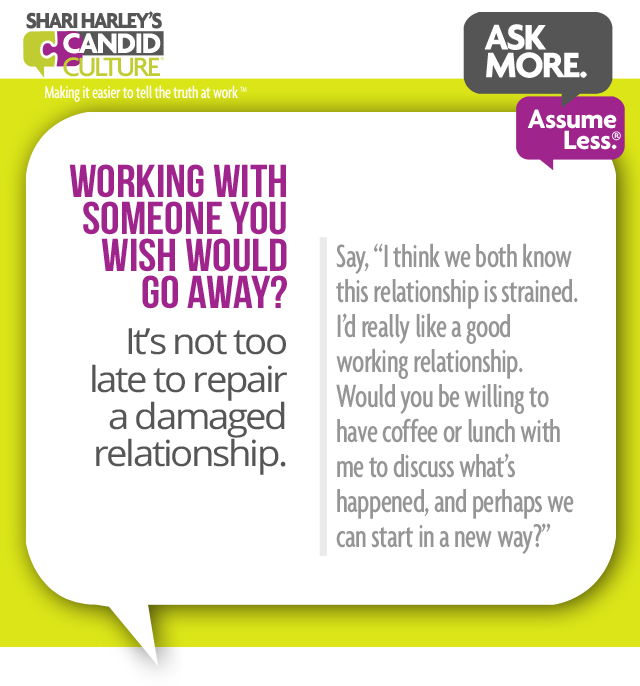Resolving Conflict in the Workplace – It’s Not Too Late
Chances are, at some point in your career, you’ve worked with someone you wished would go away. Maybe the person repeatedly threw you under the bus, took credit for your work, or didn’t keep his commitments. And at some point, you wrote the person off, and have been merely tolerating him ever since.
Damaged relationships can be repaired, if you’re willing to do some work.
The first step in repairing a damaged relationship is to decide that you really want to do so. Managing conflict in the workplace isn’t easy. It will take effort and will likely be uncomfortable. So before you take action, decide if you really want to work on the relationship.
How to know if you should even try resolving conflict in the workplace: Ask yourself how much you need the relationship. This probably sounds political, and it is. If you work on projects together, need to give or receive information, or have to work together regularly, then it’s likely worth working on the relationship. If you don’t need to work together regularly, then perhaps don’t work on the relationship.
If you decide to attempt to strengthen a relationship, plan what you’re going to say. Never trust the first thing that comes out of your mouth during a difficult conversation.

Step one for resolving conflict in the workplace: Like any feedback conversation, start with the end in mind. Consider what you want to have happen as a result of the conversation.
Step two for resolving conflict in the workplace: Plan what you’re going to say by taking notes and practicing out loud. What you say in your head is usually not what comes out of your mouth.
Step three for resolving conflict in the workplace: Ask the person for time on his calendar. People don’t like surprises. You’ll have a better outcome if the person has blocked time to talk with you. Have the conversation in-person whenever possible. If you can’t speak in-person, talk on the phone. Do not attempt to fix your relationship via email. 1. Email is wimpy. 2. It will not work.
Tell the person, “Our relationship is strained. I don’t think I’m saying anything we’re not both aware of. I’d really like a good working relationship. Would you be willing to have coffee or lunch with me, and we can talk about what has happened and perhaps start in a new way?”
Step four for resolving conflict in the workplace: Ask for a meeting to work on the relationship up to three times. If, after the third time, the person hasn’t made time, stop asking. You can’t work with someone who won’t work with you. If the person doesn’t make time to meet, be polite, professional, and inclusive, but stop trying to nurture the relationship. Inclusive means: cc’ing him on necessary emails, inviting him to appropriate meetings, and providing necessary data.
Step five for resolving conflict in the workplace: If the person makes time to meet, speak candidly, be yourself, and be vulnerable. I don’t mean set yourself up to be killed. I do mean be authentic.
How to Manage Difficult Conversations:
- Tell the person what you want.
- Ask for feedback about how you’ve damaged the relationship.
- Listen to what you hear, and resist the urge to defend yourself.
- Ask for permission to tell him how he’s damaged the relationship.
- Give small amounts of feedback, with a few specific examples.
- Make agreements of what each of you will do differently in the future.
- Thank the person for the conversation and schedule another meeting.
Step six for resolving conflict in the workplace: Build in follow-up. Most people have one conversation and expect things to be fixed, forever. Relationships don’t work that way. Agree to meet monthly, for the first few months, until you’ve rebuilt trust and learned how to communicate and work together. During the monthly meetings, give each other permission to give candid feedback about how you’re working together. I call these Relationship Inventory Meetings™.
During monthly Relationship Inventory Meetings™ ask:
- What’s working about how we work together?
- What’s not working?
- What working agreements did we keep?
- What working agreements did we break?
- Which working agreements are helpful?
- What working agreements need to change?
You might be thinking, “I don’t like this person. I don’t want to work with him. And I definitely don’t want to have these uncomfortable conversations.”
- If the nature of your relationship is impacting your ability to do your job, your professional reputation, or your happiness, all of those consequences are far worse and more long-lasting than any conversation will be.
- The conversations won’t be as bad as you think. No one will tell you anything you can’t handle, because for the most part, they’re afraid of your reaction and they know they’ll be next.
Conflict in the workplace and damaged relationships keep people up at night, reduce job satisfaction, and often motivate people to leave jobs. If you’re experiencing any of these things, all of them are worse than any conversation will be. The anticipation of the conversation is far worse than the conversation itself.
- Decide if you want to strengthen the relationship.
- Plan the conversation.
- Ask for time to meet.
- Have the conversation. Speak honestly, but responsibly.
- Plan to have another conversation before ending this conversation.
- Congratulate yourself for being courageous and picking happiness over anxiety and frustration. Suffering is optional.
Tags: conflict in the workplace, difficult conversations, giving and receiving feedback, giving feedback, receiving feedback, Resolving conflict in the workplace







